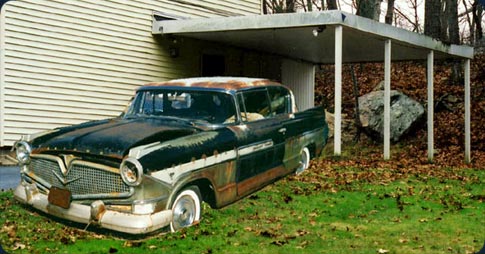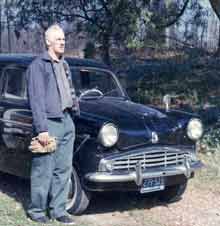Philip Worthington Foster was born 95 years ago today. Never what you’d call a “car guy,” he was endowed with that inventive cleverness we call “Yankee ingenuity.” Mark Twain’s hero in A Connecticut Yankee in King Arthur’s Court describes it best: “…if there wasn’t any quick new-fangled way to make a thing, I could invent one — and do it as easy as rolling off a log.” That was Philip Foster, always inventing new ways to do things.
He didn’t own all that many cars, perhaps a dozen over his near-90-year lifetime. But, like all his chattels and tools, he cared deeply about every one and took faithful care of them. His first car was a half interest in an
Apperson Jackrabbit (not the Model T in the photo; the Apperson’s behind it). At age 20 he bought himself a Model A Ford
Standard Roadster. In 1948, he presaged today’s sport utility vehicle craze by buying a new
Willys Jeep. Almost within the year, however, he realized that a Jeep was not the ideal family car, and supplemented it with a
1949 Mercury. The car atop this page is the
Triumph Ten, an Americanized version of the British Standard Ten, that he drove during the 1960s.
A native of Newark, New Jersey, he became a naturalized Yankee, settling in Falls Village, Connecticut, in the Litchfield Hills where he had spent summers as a boy. Like the ingenious
Stanley brothers, makers of the
Stanley Steamer and with whom he shared a birthday, he continually taught himself new skills: photography, woodworking, metal work, and offset printing. Without knowing it, he all but invented desktop publishing in the 1950s. Because he was usually the face behind the camera, there are few photos of him at work. A rare shot shows him flushing salt water from his
outboard motor, typical of his care for machinery, at Cape Cod.
From working with my father I learned countless skills: carpentry, darkroom technique, sharpening a drill by eye. From his example I absorbed a strong work ethic and sense of honor. From him I inherited many useful tools and not a few automobiles. The
Model A and
Jeep are still with me, as are his
Bantam trailer and
Simplicity garden tractor. Philip Foster’s son, like his father, does not let go of his chattels lightly.

